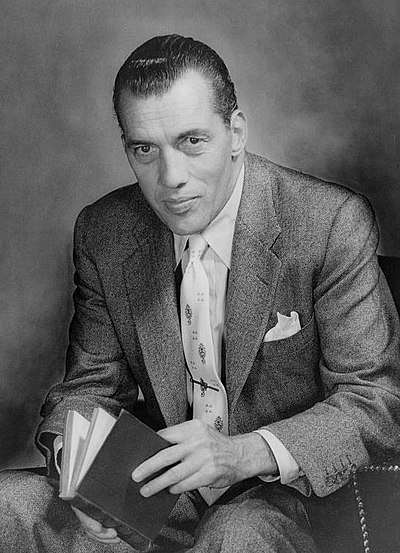Ed Sullivan

Ed does nothing, but he does it better than anyone else in television.
—Alan King
Edward Vincent Sullivan (September 28, 1901 – October 13, 1974), better known to world simply as Ed Sullivan, was an American television personality, sports and entertainment reporter, and syndicated columnist for the New York Daily News and the Chicago Tribune New York News Syndicate. He is principally remembered as the creator and host of the television variety program The Toast of the Town, later popularly—and, eventually, officially—renamed The Ed Sullivan Show. Sullivan was a broadcasting pioneer at many levels during television's infancy, and in 1996, was ranked number 50 on TV Guide's "50 Greatest TV Stars of All Time".
Although he started his career in his teens as a newspaper reporter and columnist, he had dabbled in entertainment -- producing Vaudeville shows with which he appeared as master of ceremonies in the 1920s and 1930s, directing a radio program over the original WABC (now WCBS), and organizing benefit reviews for various causes. In 1941, he was the host of Summer Silver Theater, a radio Variety Show on CBS. This led indirectly to his position as host of Toast of the Town in 1948.
Despite initial reviews for the program which verged on personal attacks, Toast of the Town -- soon to be renamed The Ed Sullivan Show -- became the television venue on which to appear. He had a newspaperman's instinct for what the public wanted, and programmed his variety hours with remarkable balance. There was something for everyone. A typical show would feature a vaudeville act (acrobats, jugglers, magicians, etc.), one or two popular comedians, a singing star, a hot jukebox favorite, a figure from the legitimate theater, and for the kids, a visit with puppet "Topo Gigio, the little Italian mouse", or a popular athlete. The bill was often international in scope, with many European performers augmenting the American artists.
n the 1950s and 1960s, Sullivan was a respected starmaker because of the number of performers who became household names after appearing on the show. He was the third to book Elvis Presley on national television -- and regretting letting other shows scoop him on Presley, became the first American show to book The Beatles, resulting in what became the single most-watched program in TV history up to that point (and which still remains one of the most-watched programs of all time).
Although angered when CBS finally canceled The Ed Sullivan Show in 1971 in response to plummeting ratings, he remained affiliated with the network and did work for them in various other capacities, including as host of the network's 25th anniversary special in June 1973. Toward the end of his life he demonstrated symptoms of what would today be called dementia, and when he was diagnosed with advanced esophageal cancer in 1974, his family chose not to tell him. He died five weeks later.
- As Himself: Played himself in the 1963 film version of Bye Bye Birdie.
- Control Freak: Could be this way about the show; he had no compunctions about ordering an artist to change their planned act (as he did with Bo Diddley and Buddy Holly) and got angry if his demands were ignored or even questioned.
- Executive Meddling: Sullivan was popular and influential enough to single-handedly buck advertiser and network pressure to exclude black performers from his show during the 1950s and 60s. At the same time, he was given to meddling in the acts of the performers on his show -- see Moral Guardians below.
- Hot-Blooded: Sullivan was quick to take offense if he felt that he had been crossed, and he could hold a grudge for a long time. He once said of himself, "I'm a pop-off. I flare up, then I go around apologizing." A biographer described him as "Armed with an Irish temper and thin skin".
- Moral Guardians: He had no qualms about telling an act to drop a song or joke if he thought it was indecent or otherwise improper. Perhaps the most famous instance was when he demanded that The Doors change the lyric "Girl, we couldn't get much higher" from their song "Light My Fire" because he felt it was a drug reference. He also had the Rolling Stones change the lyrics to their hit song "Let's Spend the Night Together" to "Let's Spend Some Time Together". At the same time, though, he was willing to butt heads with CBS's Standards and Practices department over some of his guests.
- Self-Deprecation: Sullivan had a good sense of humor about himself and encouraged comedians and impressionists to imitate and exaggerate his often stiff stage presence and nasal voice.
This page needs more trope entries. You can help this wiki by adding more entries or expanding current ones.